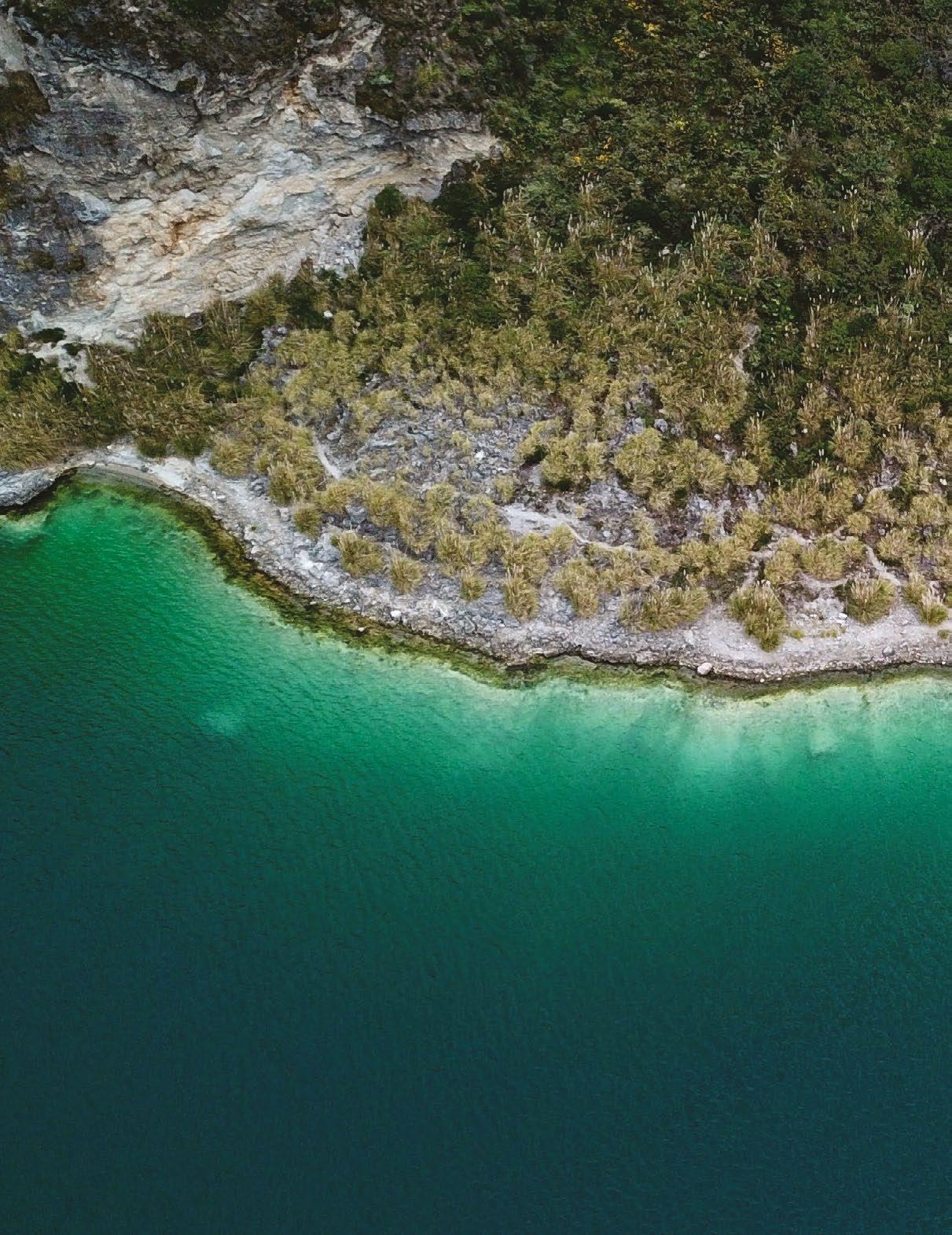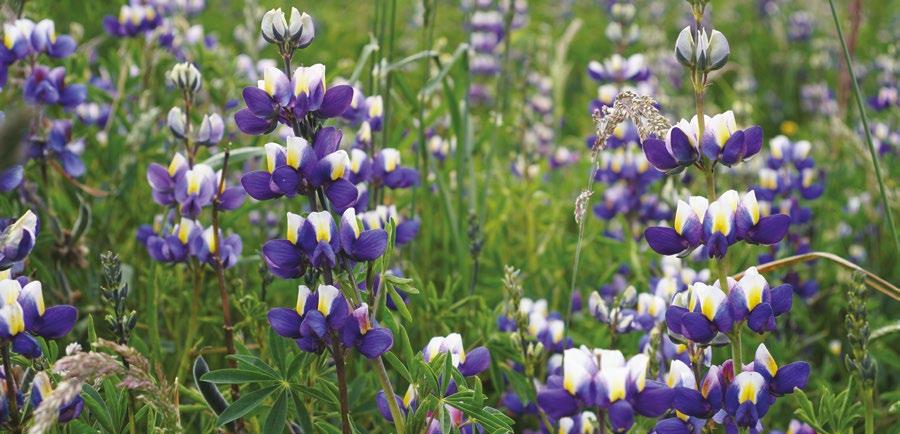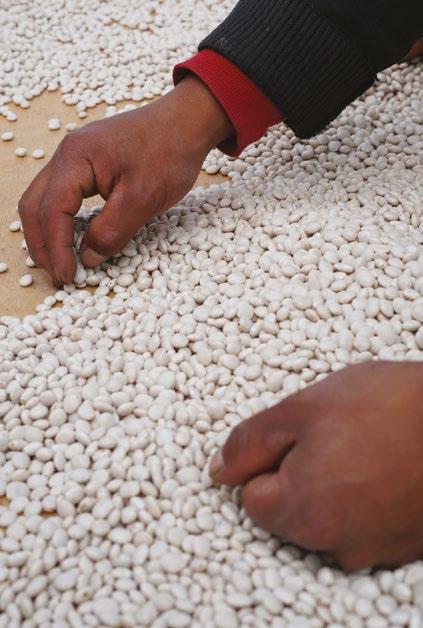
4 minute read
s n e a c t o u n r d e
SANTA BARBARA LOCAL RICKY
ECHANIQUE HARNESSES
ECUADORIAN HOLISTIC WELLNESS THROUGH POWERHOUSE PROTEIN
BRAND MIKUNA
BY Nicole Johnson
The Ecuadorian Andes’ topography evokes a story. Butter-coated alpacas graze on wispy ancient grains, while pristine puffs of white slink down snow-capped peaks, parting to wash the sun’s kindness over emerald crater lagoons. The wild splendor of the Inca Trail whispers the complexities of civilizations past, and brisk winds breathe the pulse of their nearby indigenous descendants.
Save for tourism and deforestation, this mountain range has escaped much of the industrial disruption inherent in modernization. Enter Ricky Echanique, fifth-generation Ecuadorian farmer and Santa Barbara local, attempting to preserve the pure Andean narrative while sharing one of its best-kept agricultural secrets—an unsuspecting bean—with the outside world. Nestled in lush grasslands between 9,000 to 14,000 feet, chocho predates even the Inca, offering untouched genetic biodiversity and a rich base for vegetarian ceviches of the Ecuadorian highlands. And several years ago, it offered Ricky a guide home.
A former professional tennis player, Ricky found his performance compromised by stomach pains induced by his protein intake, which slowly unfolded into chronic inflammation and lethargy. Doctor’s regimens worked to no avail. So where to? For most, Bristol Farms’ vitamin and alternative wellness aisle. Ricky’s obvious answer? A solo venture into the Amazonian depths, and an exploration of the native holistic traditions therein.
While traversing the alpine route back to Ecuador, Ricky’s eyes wandered toward curious, ubiquitous purple sprouts, revered by local farmers for their soil regeneration properties. Remembering a mention of the creamy bean enveloped by these lilac buds from an old friend, Ricky investigated chocho’s protein profile, given that soy, pea, and whey options were now off the table.

He sent a packed powder sample to a lab—from which it was rejected. “‘What are you mixing with this?’ the lab asked me; ‘Nothing,’ I replied,” Ricky chuckles. “The food branch couldn’t analyze it because it was too rich in nutrients. When they sent it to their pharmaceutical lab, I decided this was a project of its own; my Amazonian ventures went on the shelf.” Drawing upon his agricultural DNA, he partnered with indigenous farmers cultivating the crop, offering them the empowering certainty of profits in the harshly uncertain conditions of elevation agriculture. Several flavor trials and packaging designs later, Mikuna—a clean, lightweight chocho protein powder— was actualized.
Mikuna is Quichua for food, translating to “nourish the body with food” or “feed it with love”—and it excels at doing so. It sounds nearly excessive, but Ricky’s genuine zeal for natural wellness is palpable— which becomes clear to me in the initial moments of our interview, when he describes Mikuna’s digestion process as “beautiful,” an adjective I’d seldom think to attribute to the gut. The legume truly has an elegant breakdown, though: it’s bountiful in crucial nutrients, all nine amino acids, vitamins D and E, and healthy fats. The ancient Andean plant packs a punch. One serving of Mikuna—available in airy vanilla, decadent cacao, and pure chocho varieties—nourishes with 20 grams of whole protein, and no lectins, gluten, dairy, hidden ingredients (or B.S.) to hamper digestion.
No wonder it was Erewhon’s best-selling plant protein for two consecutive years following its December 2021 launch—and yes, it was on the high-end grocer’s radar just weeks after its official release. If shelving exposure wasn’t enough, Mikuna was soon the centerpiece of an initial Erewhon smoothie collaboration, Regenerada, quickly becoming the poster child for eco and gut-friendly alternative protein. The Ecuadorian gem has since been featured in July’s Erewhon x Emma Chamberlain Cold Brew Cookie blend, and now rides the momentum of a recent nationwide Whole Foods deal. And for the record, Ricky notes, Mikuna’s Erewhon smoothie debuted before they were cool.
Transcending such high-profile reception is a threetiered philosophy. “We’re here to make things better for the environment, for our farmers, and for the people who consume Mikuna,” Ricky smiles. “Environmentally, the world relies on ten chief crops; we’re providing food diversity and seed sovereignty. Mikuna is the definition of an alternative source of protein.” It’s an incredibly efficient substitute that may become our go-to, given the continued strain the climate crisis has put on land mass and resources. Chocho relies solely on infrequent rainfall, actually thriving in drought. Offering a rare dose of raw regeneration through its natural soil fertilization, Mikuna is revolutionizing a future of food that reverts agriculture back to its intuitive roots.

The underbelly of just about anything tells its true story—and Mikuna’s is no different. Vividly hued indigenous textiles stripe the bottom of each package, an artful nod to the mountain farmers who sow the seeds of its contents. Hailing from one of the first 19th century families to export cacao to Europe and North America, Ricky seeks to uplift traditional farmers by imbuing mutual visibility, genuine relationships, and stable sources of income. The lowdown: Mikuna harnesses the power of the plant through the power of the people.
And a protein of the people it is—the most vitaminvigilant athletes, like surfers Taylor Knox and Mick Fanning, have caught on. “High-velocity athletes, idolized for their longevity, are the most tuned into what they eat for performance, and they all love the clean factor. When Taylor goes on surf trips, he’s drinking Mikuna left and right and surfs for eight hours; he reports he could never do that before,” Ricky remarks. On top of attaining a coveted B-Corp certification for outstanding environmental and social achievements, Mikuna is NSF Sport Certified, serving up transparency in ingredients and functional energy fit for all levels of fitness.
I’m no Mick, but I can attest to the powder’s everyday performance in my mobility and sharpness of thought—since infusing it into my morning smoothies, I’m mindfully in tune with each step, resetting and stabilizing my body’s natural rhythm. Mikuna brings smooth to smoothies, coffees, and beyond, making them at a minimum less boring, and at best, transportive—both to a place of holistic wellness, and to the Ecuadorian birthplace of the bean.
In all facets, Mikuna feels wholeheartedly good, particularly when paired with the Riviera as its backdrop. “The best way to enjoy Santa Barbara is healthily—whether going to the Channel Islands, to surfing Jalama to Rincon, to hiking, it’s inspiring to physically thrive in such a grounded community,” Ricky smiles. “When I was in Ecuador, I’d miss Santa Barbara, and vice versa—Mikuna to me is a synergy between the two.”
As for the story of the Andean highlands? A continually pristine one, with a purpose, regenerated.*









